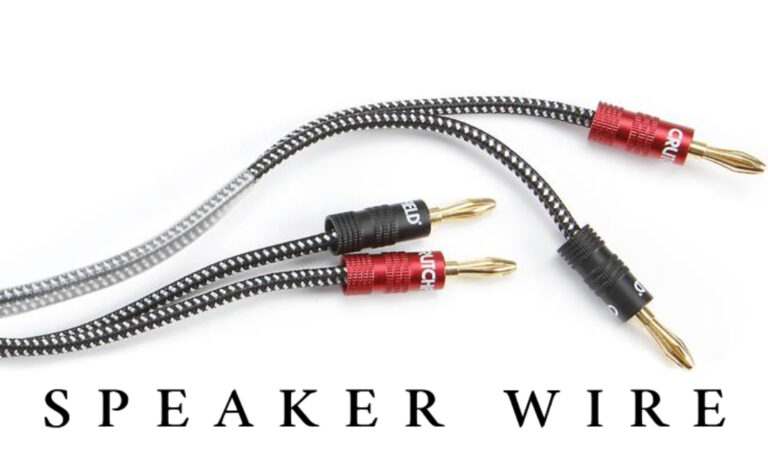Are you setting up a new sound system and wondering how to choose the right speaker wire? Do you know that the type of speaker wire you select can significantly impact your audio experience? In this article, we’ll explore everything you need to know about speaker wire, helping you make an informed decision that enhances your sound quality.
What is Speaker Wire?
Speaker wire is an essential component that connects your speakers to your audio source, such as a receiver or amplifier. It consists of two or more insulated conductors that carry the electrical signals needed to produce sound. While it may seem like a simple cable, the type and quality of speaker wire can influence the clarity and quality of the audio output.
Understanding Speaker Wire Gauge
One of the most important factors to consider when choosing speaker wire is the gauge, which refers to the thickness of the wire. Gauge is measured in American Wire Gauge (AWG), with lower numbers indicating thicker wires. For example, a 12-gauge wire is thicker than a 16-gauge wire. Thicker wires are better suited for longer distances or high-power applications because they have lower resistance, which means less signal loss.
- 16-Gauge: Suitable for shorter runs (less than 50 feet) and low to moderate power systems.
- 14-Gauge: Ideal for longer runs (50-100 feet) and higher power systems.
- 12-Gauge: Best for long runs (over 100 feet) and high-power systems.
Does Speaker Wire Quality Matter?
Yes, the quality of speaker wire can affect the sound performance of your system. Higher-quality wires use better materials and construction, which can minimize resistance and interference. Copper is the most common material used for speaker wires due to its excellent conductivity. However, some wires may use copper-clad aluminum (CCA), which is cheaper but less conductive than pure copper. If you’re looking for the best sound quality, it’s worth investing in high-quality, pure copper wire.
How to Choose the Right Length of Speaker Wire
When selecting speaker wire, it’s important to measure the distance between your audio source and the speakers. The longer the wire, the more resistance it will have, which can degrade sound quality. Always try to use the shortest length possible to minimize resistance. If your setup requires longer wires, opt for a thicker gauge to reduce signal loss.
Speaker Wire Connectors: Banana Plugs vs. Bare Wire
When connecting SpeakerWire to your speakers and audio source, you’ll need to decide whether to use connectors like banana plugs or go with bare wire. Both have their pros and cons:
- Bare Wire: Simple and inexpensive, but can be prone to fraying and may require more frequent maintenance.
- Banana Plugs: Offer a secure connection and are easier to insert and remove, but they add to the overall cost of your setup.
Also read: Cambro TV: Your Ticket to Next-Level Home Entertainment
Can You Hear the Difference? Myths vs. Reality
There’s a lot of debate around whether the type of SpeakerWire makes a noticeable difference in sound quality. While some audiophiles claim that premium wires enhance sound, others argue that the differences are minimal and not detectable by most listeners. The truth is, for most home audio setups, a standard 14 or 16-gauge copper wire will perform adequately. However, if you have a high-end system or are running long distances, investing in better-quality wire can provide some benefits.
Common Mistakes to Avoid When Buying Speaker Wire
Choosing the wrong SpeakerWire can result in poor sound quality or even damage to your equipment. Here are some common mistakes to avoid:
- Using the wrong gauge: Always match the gauge to the distance and power requirements of your system.
- Buying cheap CCA wire: While affordable, copper-clad aluminum wire can compromise sound quality, especially over long distances.
- Ignoring the importance of connectors: Ensure that the wire you choose is compatible with your speakers and audio source, and consider using banana plugs for a secure connection.
How to Properly Install Speaker Wire
Installing SpeakerWire correctly is crucial for optimal performance. Start by measuring the required length and cutting the wire accordingly. Strip the insulation carefully to avoid damaging the conductors, and ensure that the connections are secure, whether you’re using bare wire or connectors. Label the wires if necessary to avoid confusion during installation.
Conclusion:
Choosing the right speaker wire is more important than many people realize. It plays a key role in delivering clear, powerful sound from your audio system. By understanding the factors that affect speaker wire performance—such as gauge, material, and connectors—you can make an informed decision that enhances your listening experience.
FAQs:
What gauge SpeakerWire should I use for a 50-foot run?
A 14-gauge wire is typically sufficient for a 50-foot run with most home audio systems.
Is it worth buying expensive SpeakerWire?
For most setups, standard copper wire is sufficient. High-end wires may offer minor improvements but are often unnecessary for average users.
Can SpeakerWire affect sound quality?
Yes, using the correct gauge and quality of wire can reduce resistance and improve sound clarity, especially over longer distances.

